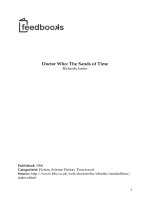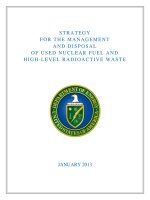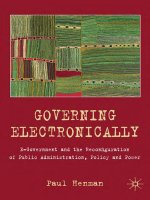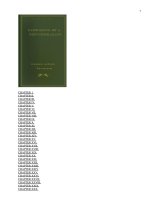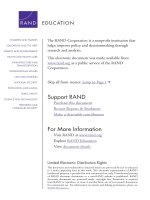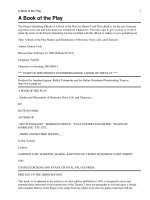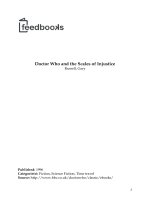the companions of doctor who turlough and the earthlink dilemma
Bạn đang xem bản rút gọn của tài liệu. Xem và tải ngay bản đầy đủ của tài liệu tại đây (659.91 KB, 182 trang )
Of all the companions ever to travel with the Doctor in the TARDIS, Turlough
was the most enigmatic and the most disturbing. Exiled from his home
world, he saw the Doctor as a means of escape from Earth – and for that he
was prepared to kill.
But just who was Turlough? And what happened to him after he left the
Doctor?
Now Turlough has returned to Trion, but to a Trion much changed since his
exile. Who are the mysterious Gardsormr? What is their secret purpose? And
what is the shocking and terrifying link between Trion and planet Earth?
The Companions of
Doctor Who
TURLOUGH AND THE
EARTHLINK DILEMMA
Tony Attwood
By arrangement with the
British Broadcasting Corporation
A TARGET BOOK
published by
the Paperback Division of
W.H. Allen & Co PLC
A Target Book
Published in 1986
by the Paperback Division of
W.H. Allen & Co. PLC
44 Hill Street, London W1X 8LB,
by arrangement with the British Broadcasting Corporation.
Copyright © Tony Attwood, 1986
Printed in Great Britain by
Hunt Barnard Printing Ltd, Aylesbury, Bucks.
ISBN 0 426 202368
This book is sold subject to the condition that it shall not, by way of trade or
otherwise, be lent, re-sold, hired out or otherwise circulated without the
publisher’s prior consent in any other form of binding or cover other than
that in which it is published and without a similar condition including this
condition being imposed upon the subsequent purchaser.
Contents
INTRODUCTION vii
00: PROLOGUE 1
01: ACE 3
02: DUO 13
03: TRIO 33
04: 4D 49
05: MAGIC 63
06: MOBILE? 77
07: TRANSPORT! 87
08: NEW TRION ON TRION 95
09: JURAS? 109
10: PHARIX 121
11: KNAVE 139
12: QUEEN 155
13: KING 169
‘Philosophers merely explain the world. The thing however is to change it.’
INTRODUCTION
Dear Readers,
I imagine that most of you about to embark on Turlough And The Earthlink
Dilemma will have seen my portrayal of the character on BBC TV – be prepared
for a surprise!
One of the problems of being a companion on Doctor Who is that you would
really, of course, like to be playing the Doctor, but within the context of a 25
minute episode there just isn’t time for everyone to play a leading part, or to
have their character developed as fully as you might wish. . . You may have
noticed that Turlough spent a great deal of time kept captive in various states
of bondage. It was always a disappointment to me that there seemed to be no
getting around this problem. The novel puts no such limitations on the writer,
and Tony Attwood comes out with creative guns blazing.
I first met Tony eighteen months ago when he was doing research for the
book, since when he has constantly been in touch, but the end result of his
labours surpasses even my expectations. Here Turlough arrives for the first
time with three dimensions: he has warmth, depth, a sense of humour (be-
lieve it or not!) and, dare I say, a ‘humanity’, which leads to a romantic side
to his nature, which, as a confirmed romantic myself, was especially nice to
see – hanky-panky was a definite no-go area in the TARDIS!
For one who lives without answerphone, video machine or computer, and
whose only concessions to modern gadgetry are an ancient black and white
television and a food mixer, some of the scientific jargon was a little difficult to
understand – you may have noticed me having the occasional problem getting
round the words on Doctor Who sometimes – but the story kept my attention
throughout as I’m sure it will you.
I shall tell no secrets to give the game away, but leave you to discover the
real Turlough for yourselves; suffice it to say, be assured that the wretched
shining cube does not make an appearance – I made sure of that!
Best Wishes,
Mark Strickson (and Turlough)
00: PROLOGUE
For over nine thousand years the Clans had ruled Trion and the Trion colonies.
Initially the regime had been harsh, even dictatorial as Clansmen and women
set about formulating the mould that was to last through the millennia. That
regime could be summarised in two words: science and technology.
To the Clans, scientific research and development, combined with its ap-
plication into all technological fields, was the centre of their philosophy; the
heart and soul of their existence. Everything was secondary to the maximis-
ing of scientific achievement; from the development of science all good would
flow, life would be better, richer, freer.
And in many ways they were right. After the early days of Ykstort I and
Nilatis IV the Clans began to settle down. The good things of life became
more plentiful, shortages were of the past and the vast mass of the populace
(who were not of the Clans) were left to get on with their own lives, organising
themselves as they best pleased. If they chose war and savagery, as they did
from time to time, that was their affair. The Clans did not interfere.
The empire expanded. Everyone recognised Clan supremacy, and in return
for that recognition the Imperial Clans, as they became known, were happy
to pass on the fruits of their research. Some ideas caught on at once – the
one thousand kilometres a minute Vacuum Transport system, for example,
revolutionised travel overnight. But the development of cold fusion power
waited four hundred years before a non-Clansman realised it made for smaller,
more efficient, faster space ships. The Clans had known this all along, but
somehow never got round to telling anyone.
Yet despite all their work certain problems were never solved. On the prac-
tical front the key question of time-travel remained beyond reach, although
several great minds almost resolved the issue, only to have their final ex-
periments fail – deliberately sabotaged by Time Lords, according to popular
rumour. And in the field of pure theory the last outstanding issue was the total
comprehension of the way in which the four fundamental forces that link the
Universe combine. That too seemed eternally out of reach.
Such difficulties did not worry the Clans overmuch. Freedom and plenty
(for them at least) were assured, and secure in their remote citadels deep in
the forests of Trion they could look ahead to another nine thousand years of
science.
1
Except for one thing. Being so far removed from the bulk of the population
they failed to notice a change – a new development in everyday politics on
the planet, a development that finally brought about a revolution which over-
threw the Clans and exiled the Imperial Clansmen and women to old, now
deserted colonies and uncivilised planets far away from Trion influence.
The revolution, backed by a significant section of the populace, nevertheless
made many uneasy, for although the Clans had remained autocratic and aloof
they had not actually hurt anyone for thousands of years, and had certainly
given much in return for recognition as the nominal rulers of Trion.
Yet as the mutterings of discontent grew following the revolution, so too did
the control of the revolution by one person, the aging but forceful Rehctaht,
the most dominant unforgiving woman Trion had ever known.
Her rule lasted a mere seven years, and during that time virtually all Clans-
men were exiled. According to Rehctaht, the Clans could now learn the error
of their arrogant ways. Their rule would be broken forever.
Among the exiles was one Vislor Turlough. Young, barely more than a boy,
he found himself sent to Earth, where the local Rehctaht agent gained him
a place in a minor public school in southern England. Desperate to escape,
the boy allowed himself to be used by the alien Black Guardian as a pawn in
an attempt to kill the Doctor. The plan failed, and Turlough found his escape
from Earth travelling with the Time Lord around the galaxy in that space and
time ship called the TARDIS. But then an emergency call led Turlough back
to a Trion colony, and the young Clansman realised it was time to give up
running and face the rest of his exile.
Rehctaht, meanwhile, was having troubles of her own. She had promised
liberty from Clan rule, and the chance to develop new Trion technology
through this supposed new freedom. But the developments failed, and the
promised liberty proved to be a myth. As the economy declined so Rehctaht
was turned upon and a second uprising brought in the counter-revolutionary
Committee of Public Safety. Exile orders were rescinded and Clansmen were
encouraged to return. At last Turlough could walk on the Home Planet a free
man.
In common with all those who did make it back he was treated as a hero,
and implored to aid the return to the old ways. This most Clansmen readily
agreed to do, although they knew the days of splendid isolation were over.
From now on the Clans would live more closely with everyone else.
2
01: ACE
Turning, the guide reviewed her party. There was little to distinguish the
group from any other she took round the site three times a day, two hundred
days a year. Tourists waiting to be shocked, men trying to impress with their
(invariably erroneous) academic knowledge, children anxiously waiting to get
into the underground caverns (and children scared witless who had just come
out), and the occasional professor seeing for himself after years of lecturing
students on the subject of the early ruins of the planet.
Yet despite her initial dismissal of the group there was one distinguishing
feature. And if the woman in the blue one-piece jumpsuit had not asked a
ridiculous question about the wall inscriptions the guide would never have
noticed. He (that is the factor that distinguished this group from any other)
was bending low, peering intently at a set of excavations which revealed one
of the layout diagrams discovered during the first dig. It was, the guide knew,
a significant find, for without it the archeologists could never have made such
an excellent job of the site as a whole. The diagrams not only told them
where to look, they also told the excavating team what they were looking for.
Not that these tourists would appreciate that. If it didn’t move, or better still
frighten, they weren’t interested.
Except this man. She recognised the face, the ginger-blond (or should that
be sandy brown?) hair, cut short just touching the ears, the slightly pointed
chin, the deep set, cold blue-grey eyes.
A movement in the party brought the guide back to reality. She removed her
eyes from the man and led the way down a steep slope into the fifth chamber,
returning to her script.
‘Who the builders were,’ she droned in a voice made monotonous by the
endless repetitions of uninspired prose, ‘is unknown. Most of the buildings in
this complex seem to have been built about 240,000 years ago, suggesting a
short period of construction followed by a period of exploration of not more
than ten thousand years, and then departure. We don’t know why they came,
what they found, or why they went. We can only surmise facts about them
from what they left behind.’
Still speaking, the guide once more sought out the sandy hair and clear
eyes. She nearly missed them, until she spotted the man once more bent
double studying an inscription on the wall; a set of characters which were
elevated above the surrounding symbols seemed to fascinate him particularly.
3
He was young, barely more than a boy, perhaps twenty years old, no more;
taller than average but not excessively so, and dressed more casually than
was the current style, fading green trousers, a grubby white T shirt and white
running shoes. There was a lean hungry look about him that reminded the
guide of an ancient legend she had been read by her mother as a child. It was
something about men being dangerous when they have that look.
He was the only member of the party who was obviously not with a friend,
as well as being the only one not carrying either a camera or a monitoring
unit. For that one fact her heart went out to him. The monitoring units were
programmed to put the official guide-talk on the screen to match whatever
the unit was pointing at. With a real live guide and an active monitoring unit
one had total redundancy of one unit. And after fourteen hundred trips round
the ruins the live guide knew which unit she felt was redundant.
Turning once more the guide drove her party on. ‘The most obvious fact to
be deduced from these ruins,’ she announced moving into a new chamber, ‘is
that these buildings were constructed by beings of similar physical appearance
to ourselves, although possibly slightly taller. The door height allows us com-
fortably in, and we could imagine living, although in a rather cramped way, in
any of these quarters. This is not so of the ruins in Mhacha, Connall or Bricriu.
The people, beings, entities or whatever they were that built Mhacha were at
least twice as tall as us, those at Connall left rubbish tips which are not found
at Mhacha and Bricriu, and were only found to a limited extent here, and we
can be sure that the beings at Bricriu were also exceptionally interested in
wide spaces and luxurious conditions for their living accommodation. Indeed,
unlike the builders here we may also imagine that they had problems coping
with our gravity. In fact, it may be said that our builders here seemed to be
almost able to ignore gravity.’
The guide turned to move on, but a question held her back. ‘What was in
the waste tips?’
A regular question. It was from a sixteen-year-old boy. ‘At Connall the
tips contained building materials and samples of rock, plants and anything
else moveable that had presumably been taken across the planet for study
at that base. At Connall we even find remnants that probably came from
the settlement here, which almost certainly predates Connall by ten thousand
years.’
‘And here?’ He spoke. It was the man she had been watching. He had been
peering carefully at the floor and now straightened up to catch the reply. She
wondered why he asked. She wished he hadn’t.
‘Animal bones, small alloy containers. . . ’
‘Anything else?’
‘Excrement.’
4
‘Which showed what the inhabitants ate?’
‘Yes.’
‘What did they eat?’
‘Our ancestors.’
There was a stir among the tourists. It wasn’t that visitors were not allowed
to know what the beings who had built this complex had lived on, it was
just that the news was never broadcast. The owners of the land (who gained
most from the tourist trade) knew perfectly well what stories were good for
business and which ones were not. After all, they argued (and as the guide
suggested in her officially approved speech), their planet had been visited at
least five times in its history, and apparently each time by a totally different
race of creatures. It just so happened that they owned the land on which were
to be found the ruins of the race that did the most unspeakable thing.
‘And it was about a quarter of a million years ago you say?’ It was clear he
was not letting go of whatever it was he was chasing.
She nodded dumbly, her face just discernable in the half-light thrown up
from the deliberately feeble torches attached to the walls.
‘So our ancestors were us. I mean they had developed into us. There’s been
no genetic development in the past quarter of a million years has there?’
At last rescue came. No one actually spoke, but several of the party had
started to head towards the next chamber. They had paid good money to see
the Giants’ Drop and they weren’t going to be held back by unpleasant debates
about the diets of beings from other planets. As she pushed her way to the
front of the party, the guide heard a deep eastern accent tell the man not to
upset the young lady so. She was grateful.
From then on he said nothing, but continued his detailed examination of
wall markings, roof heights, holographics, in fact everything the guide men-
tioned and quite a few findings she didn’t. At the Giants’ Drop he did what
everyone else did, pushing his head against the magnetic barrier, straining to
see as far down into the depths below as he possibly could. ‘The Drop is not
natural, but carved out of the rock,’ the guide informed the party. ‘The path-
way we are walking continues uninterrupted on the other side. The distance
to the bottom of the Drop is in exact ratio to the distance across as the dis-
tance of Cu Chulainn to our planet, and our planet to Cu Roi. However such
astronomical exactitudes seem meaningless since the builders did not bother
to excavate upwards and clear the small amount of earth above their heads so
that they could see the satellites and the sun.’
There was a slight coughing sound. One of the more nervous members of
the party was going to try and ask a question in a desperate attempt to delay,
or perhaps abandon having to walk across the Drop. But the guide knew
the ploy well, and before the portly gentleman in regimental clothing who
5
was already trembling profusely could put any queries she pushed on. ‘The
bottom of the Drop has been fully examined. It is unnaturally smooth and
covered in a silvery metallic alloy several metres thick. There are no markings
and no indications of use other than that of a floor covering.’ She pressed
a contact point set into the rock. Red lights appeared where the magnetic
barrier had been, clearing at one point to indicate where the force lines of the
magnetic field would support the little party as they made their way across
the Drop. This was what they had paid for. From now on there would just be
a combination of fear and sweat on the tourists faces: no more no less.
To all intents and purposes it seemed as if they were to travel across thin air.
Below was nothing. The Tourist Board had removed the illuminations at the
bottom of the Drop long ago, after the guides had complained that it was not
their job to deal with symptoms ranging from heart attack to violent vomiting.
Now it looked as if one was walking across a dark hole, and that in itself was
not too unusual. It gave people a scare because in their minds they knew how
deep the Drop was. But they no longer saw that alien polished floor below,
and that made all the difference.
As always the guide went across first. Reaching the other side she looked
back at the mystery man. A smile grew on her lips. Now she had him – he
was standing on the far side pretending to study some markings, just as he
had done throughout the tour. Except she had seen it all before; the pretence
at interest, the sudden desire to study rock patterns, anything to save having
to face that walk across the Drop. How appropriate that this enigmatic figure
who had embarrassed her with his questions should be the one to flunk the
walk this time round.
Yet even as she thought of the joy she would have in calling up the Guard
Attendant to escort him back to the surface via the emergency staircase on
his side of the Drop, the man half rose, and with little more than a cursory
glimpse over his shoulder walked backwards onto the magnetic bridge. The
guide couldn’t believe her eyes. He was still stooping, still peering at the
walls as if trying to measure angles, check dimensions, evaluate structures.
He got to the other side and didn’t even notice he’d been across one of the
Five Wonders of the World.
After the Giants’ Drop the rest of the ruins represented for the average
tourist nothing more than distraction – obstacles in the way of getting out
to the fresh air above. The Drop was what they had paid to cross and they
had done it. Now they could return and tell relatives and friends they had
walked across the deepest hole in the Home System.
The guide, knowing the mood from long experience, moved rapidly, taking
in the remaining wonders at full speed, passing in seconds over discoveries
that had only been revealed after years of painstaking work, structures that
6
had taken decades to put back together, moving through chambers that them-
selves appeared to be constructed thousands of years apart – despite what the
guide had said (with, it must again be acknowledged, official backing.) And
then suddenly they were up and out in the open air. The red hues of Major,
the dominant star, mixing with the blues of Minor, the dwarf companion, giv-
ing the landscape of tall elegant buildings standing amidst the golden corn
colours a shading unknown on worlds served by only one sun.
During those final moments the guide had all but forgotten her mysteri-
ous visitor with his deep interests and awkward questions. Now she remem-
bered, and mechanically acknowledging the thanks (and tips) of the tourists
searched him out. But search as she might, he was not to be found. Reluc-
tantly the guide moved back down the exit stairs onto the final chamber – the
ruin museum. As she had expected he was there peering at inscriptions on the
plates and cups neatly arranged on the display shelves. It was the only place
that such markings could be found. Not only here on the Home Planet but in
fact in the whole planetary system of eight worlds and thirty-seven satellites.
He looked up at the sound of her footsteps.
‘These markings are different,’ he announced. ‘Yet you didn’t mention
them.’
The guide shrugged and put her hands on hips. ‘Not part of my speech,’ she
replied. ‘The commentary for guides is written by the curator. Deviations are
not encouraged.’ She paused looking for a reaction but found none. There
was an intensity about the man that was unnerving, giving the feeling that
nothing would get in his way. ‘But that’s what you’re doing,’ she continued.
‘Deviating. The tour is over. You should be outside.’
‘If you don’t want people looking at the relics, why build the museum?’ he
asked reasonably. She looked back at the stranger but said nothing. With a
single movement he pushed past her in the narrow tunnel and headed for the
outside. She followed, with but the slightest glance at the markings that had
fascinated the man, reaching the surface just seconds behind him, and only
just in time to catch a shout.
‘Turlough!’ It was a young woman. Long dark hair, very pretty, probably
about the same age, with none of the intenseness about the face, yet certainly
sharing with the man in terms of bearing and style. However, she combined
that with the open friendly look that was more typical of natives of the Home
Planet. The man looked up and clearly recognised the girl, but gave little sign
of being glad to see her. Instead, he took a path away from her, forcing the
woman to run across the grass to intercept him before he entered the nearby
corn field. As she reached him she began to speak.
Strain as she might the conversation was lost to the guide, but it caused
her no concern. The man was Turlough, that was enough. Knowing that
7
one fact she would now have the attention of every friend, half-friend and
acquaintance for the next month with the story. The feeling that she was at
last to be a celebrity in her own little circle, if only by passing association, put
all thoughts of the motives of the man out of her head. She had shown the
famous Vislor Turlough round the ruins of Charlottenlund.
To the woman who had called Turlough’s name however a passing meeting
was far from enough. Finding him unwilling to stop and talk, she was forced
to put her questions whilst trying to keep up with a very fit young man intent
on marching at full speed. ‘During the past week,’ she called gasping for
breath, ‘you have visited over half the museums of alien life on the planet.’ As
he kept walking she grabbed his arm and finally slowed the man down. ‘What
are you going to do now?’
‘If you must know,’ he replied angrily, turning to face her, ‘I shall be visiting
the Museum of Natural History at Efnisien, if you will allow me to get there
before closing time. And tomorrow I shall be on the Njordr Nerthus shuttle to
Fodla base to examine the ruins there. Now if you will let me continue. . . ’
He pulled his hand free and pushed forward, but the girl would not be put
off. ‘Turlough,’ she called again. ‘Let me ask you one question.’
Something in the woman’s voice made him relent. He stopped and turned,
looking her straight in the face. They had reached a clearing where the crop
gave way to gravel in a no man’s land between agriculture and industry, be-
tween food growing and food processing.
‘One question,’ he said.
The woman’s response was simple. ‘Why?’
He gave no reply, and turned as if to continue walking, but she was not
to be put off. ‘Turlough, you are an established citizen. Very few Clansmen
survived exile – hardly anyone escaped. When you came back we all thought
you were returning to rule, to lead, to help. But all you’ve done since you’ve
been back is traipse around the ruins alongside packs of schoolchildren and
tourists with not enough imagination to find anything better to do.’
For a moment it looked as if Turlough was going to offer an explanation,
but it passed and he remained silent.
‘Turlough, do you know who I am?’
‘You are Juras Maateh.’
‘Is that all?’
‘What do you mean?’ He seemed genuinely perplexed.
‘Before you were forced to leave by Rehctaht you promised you’d return.’
‘And I did.’
‘But you promised you would return to me.’
In a second the confidence of the man slipped away. He lowered his head
and put a hand on the woman’s shoulder. ‘I’m sorry,’ he said. ‘Something has
8
come up. Something that I need to work on.’
‘Something that takes up all your time? Something that stops us seeing
each other when we’ve already been separated two years?’
‘For the moment, yes.’
‘Before you left, Turlough, you were a strong forthright Imperial Clansman
of the Home Planet, taking your duties and life seriously – and that included
finding time for an Imperial Clanswoman – me. You shared your thoughts and
ideals with me. I also felt I had same contribution to make. Now. ’
‘Now is different. Besides you have your own life. What have you been
doing whilst I was away? Haven’t you organised in some way?’
Juras looked at Turlough in despair. It was no use arguing with the man.
She would need less direct methods if she were to be successful in her quest.
Without a word she turned away, back towards the museum, leaving Tur-
lough free to march rapidly to the VT station. With luck he thought the Vac-
uum Tube would get him to Efnisien with an hour to go before closing time.
The National Museum of Natural History of the Home Planet had changed
little since Turlough had last visited it, although that visit was now some eight
years in the past. Indeed, its location on the single continent that dominated
the largely unpopulated northern hemisphere of the planet was a major con-
tributory factor to this lack of change. The law prohibiting any building or
enlargement of existing structures within one thousand kilometres of the mu-
seum simply ratified what was already the case, for no one in their right mind
would dream of building anywhere near the Sacred Temple and its even more
sacred Mobile Castle.
The name of the latter, of course, was illogical. Castles, no matter how
sacred they might be in the dominant religion of the planet, did not move. And
if that were not to be proven (since it was always possible to argue that out
there, somewhere, someone would someday discover a castle that did move),
what could be said for sure was that throughout recorded history the Mobile
Castle had not moved one millimetre, not even when the ground around the
Sacred Temple had been shaken by a series of unexpected quakes in the forty-
second century.
The Vacuum Tube delivered Turlough to the main gate entrance of the Tem-
ple grounds. In front of him, a series of steps led up the side of a thirty metre
high wall, into a tunnel and then out again before finally, and for no apparent
reason, leading back down to the pink ground below. After all that it was no
more than a few seconds stroll through the Temple grounds before reaching
the square building of the also thirty metre high Mobile Castle. Blue vines,
which emitted a singularly tasty but foul-smelling yellow slime, covered the
walls at all points except one – a door kept open through a gravity shield
9
located underground. That shield was also a mystery. It worked, but no one
knew how. Many had wanted to dismantle it and find out, but being on sacred
ground such interference was forbidden. The vine, needing gravity to grow,
shunned the free fall area at the edge of the shield and allowed the visitor to
walk through.
Despite his long absence from the museum Turlough knew exactly where
he wanted to go. Marching briskly past the surprised receptionist he passed
through four rooms until he stood in a long corridor bedecked on either side
with bones, reconstructed in the supposed image of the Laima, first of the five
sets of aliens thought to have visited the Home Planet. Getting as close to
the bones as he dared without setting off every alarm system in the building
Turlough peered intently at the joints, skull, teeth, eye sockets, and later,
charts of imagined blood circulation, hand movements, and even clothing.
The Laima appeared to have been of slightly greater stature and build than
the present occupiers of the planet, although with much more developed fore-
heads, and, as every schoolchild pointed out, incredibly long fingers and toes.
From the fragments of records and oddments that they left behind (they had
left no buildings – at least none that had survived, unless the ruins at Char-
lottenlund were theirs) it was supposed that they had great mental powers,
power enough it was said, to control all life on the planet, vegetable and ani-
mal. Some myths even had it that the Laima were able to control the minerals
in the ground – even the very ground itself, although those scientists who
considered themselves part of the more serious contemporary school would
have nothing to do with such thoughts. Indeed many rejected even the con-
cept that the Laima actually existed, largely because the name was so closely
related to the ancient word laimee, meaning happiness. As Turlough would
have admitted had the thought crossed his mind, any species which had total
mental control of the planet and non-stop happiness had a lot going for it.
Next was another supposed creature from the same period – a kind of giant
mollusc, although here again there was great debate as to whether anthro-
pologists had actually reconstructed the being correctly. Certainly it looked
cumbersome and huge – big enough to flatten even the strongest Trion if it
took it into its head to slide that way.
Turlough was still peering at the recreated skeletons when the Sub Curator
came and found him an hour later. Being forced to spend his time in this
isolated spot, and hence having more time for the public media than the better
paid museum guide at Charlottenlund, the curator recognised Turlough at
once.
‘Don’t get so many visitors these days,’ he announced leading the way back
to the main door. ‘At least not as many as distinguished as you.’
‘Distinguished?’ Turlough looked around uneasily. Then as the implication
10
of the remark sank in he coughed nervously and nodded.
‘Is there anything I can help you with?’ the Curator persisted, not to be
fobbed off.
‘No, nothing, thank you,’ the young Clansman replied automatically. Then
he changed his mind. ‘Yes, there is one thing. Did the Laima build the Mobile
Castle?’
‘Some say they did, sir, but who really knows? The evidence, where it exists,
is contradictory. Geologists say the rocks that built it are not to be found on
this planet – and never have been. The structural engineers say it looks as if
the castle suddenly arrived here from another planet. The historical engineers
suggest it happened only yesterday – but that of course is impossible.’
‘Then what came first? The Sacred Temple outside, or the Mobile Castle
inside?’
‘The Temple and Castle are undoubtedly the same age, sir.’
Turlough changed track. ‘The Laima look like Slots to me,’ he said.
The Sub Curator smiled but said nothing. Seeing he had got all he could
from the man, Turlough marched through the door and into the florid under-
growth that endlessly threatened to overrun the buildings.
Not surprisingly, given the remoteness of his location and the lateness of
the hour, the VT terminal was empty. A chair was waiting for him on the
platform and without pausing he sat down and punched up the co-ordinates
for the nearest aerodrome. The move would effectively by-pass Juras. Having
been told where he was going she would be waiting near the main spaceport
hoping to intercept him before he made it onto a scheduled flight
Taking a ship from the remote provincial port of Reyer to Fodla base meant
that Turlough’s trip to Njordr Nerthus, most distant but largest of the Home
Planet’s three moons would take six hours instead of three as it would on the
regular passenger ships that left from the capital. But Turlough needed sleep –
and time to think – and the trip he knew would give him an opportunity for
both. Certainly by the time he arrived on Njordr Nerthus he felt happier in his
plans, and more able to deal with Juras Maateh whenever and where ever she
might next catch up with him.
11
02: DUO
At a distance of some twenty-three million kilometres from the Home Planet
Njordr Nerthus was the sort of world that the Tourist Guides and Vidisplays
called ‘interesting’, which by and large meant they could find precious little
to say about the place. With its two rivals far closer to the Home Planet and
hence reachable in under an hour the moon’s owners were always going to
be pressed to find any reason to attract people. A distinct lack of minerals,
and an apparently total lack of native life forms of even the lowest nature was
combined with a thoroughly poisonous atmosphere, which meant that, not
only did one have to wear a spacesuit, one did not even get the totally clear
atmosphere-free view of the skies that the much smaller inner moons had on
offer. It all spelt bad news for the owners.
Only two things had ever given the managers of the Njordr Nerthus econ-
omy some slight degree of hope that their forsaken world might begin to earn
some credit exchange. The first was a strange (and totally unfounded) ru-
mour which originated some fifty years previously that the girls born on the
satellite were the most beautiful within this zone of the Galaxy.
The second was the publishing of a vidisplay programme which claimed
that despite all the evidence of alien visitors having come direct to the Home
Planet during the past million or so years, and despite the fact that not a single
alien ruin, bone or artifact had ever been discovered on Njordr Nerthus, it was
in fact this moon in the midst of nowhere that had been the main settlement
for those various visiting races.
Naturally, when the work had first been published it had met with total
derision by scientists, archeologists, historians and everyone else who had
ever felt the need to pronounce on the early populations of the Home Planet.
But largely because of its reversal of all known facts the theory had caught on
with the general public, and the tourist trade had followed. The President of
the Central Museum on the moon hadn’t been best pleased of course. His tiny
collection of volcanic rocks, and glass cages of specimens which had been bred
specifically to exist in the hostile atmosphere looked even more unexciting
than usual once the visitors from the Home Planet started working their way
through the catalogue of recent discoveries (or inventions depending on your
point of view) of Njordr Nerthus.
As Turlough stepped out of the ancient and deteriorating spaceship and
through the connecting gangways into the reception lounge he took his first
13
glance at his fellow passengers. A number of them were looking closely at him,
some inevitably knowing his face but not being able to recall if he were famous
as an explorer, politician, criminal or sportsman. Others, however, had worked
it out and were busy telling their fellow travellers just who it was they had
journeyed with. Speculation as to what such a famous Clansman was doing
travelling on such a slow trip to such an isolated place was reaching fever pitch
as Turlough turned his back on the crowd, showed his documentation to the
entry guard, gained a very smart salute once his name had been revealed, and
made his way to the least crowded of the tour operators’ concession stands
that faced him.
The booking clerk, her mind stupified through arranging the same trip for
hundreds of people day after day failed to look up as Turlough stated that
he wanted to take in the entire gamut of alien sights. Only when he put his
account card in the desk slot and the hard copy print out came through did
a slight smile pass her face. ‘A famous name,’ said the clerk, pressing the
computer terminals which would automatically double check that Turlough’s
account could take the cost. ‘I expect everyone says. . . ’ She left her sentence
unfinished as she finally looked up and recognised her customer. Turlough
heard her mutter some words of apology as he took the ticket, perhaps a little
too hastily, and made for the departure lounge.
In all, Turlough visited eighteen sights. Some were so ludicrous he forgot
them as soon as he was back in the surface buggy, spacesuit removed. Others,
fakes and frauds as they were, stuck longer in his mind. The ‘ten thousand-
year-old’ giant head sculpture looked nothing like the alien the guide book
suggested, and was clearly suffering from the atmosphere. Yet in the vidguide
picture taken just four years before there was no decay. It was a typical fake.
The carvings of beings from the Quasar Galaxy were almost certainly copies
from the rock engravings on the Home Planet made not by aliens but by the
actual inhabitants of the planet – ancestors of the current population – about
twelve thousand years before. The ‘map’ of the rivers that flowed on Njordr
Nerthus carved on a cave roof was not ‘remarkably accurate’ but little more
than a random collection of scratches almost certainly made by one of the
many animals the Old Regime had transported to the satellite in a vague hope
that somehow they might rapidly mutate into beings that could live naturally
in the atmosphere. (None of them had.) As such the date didn’t particularly
matter. It was all a hoax.
Knowing that Juras Maateh would not let him slip by a second time Tur-
lough took the rapidtransit ship back to the Home Planet and was, as ex-
pected, met at the aerodrome. He was disconcerted however to face not
a barrage of questions and admonitions but instead a very quiet Juras who
seemed satisfied to fall in step alongside him as he walked across the aero-
14
drome concourse to the VT terminal. In the end he felt obliged to speak.
‘My home,’ he said, indicating the destination location he had typed into the
departure control board. Still she said nothing. ‘Will you come?’
Juras smiled and nodded, and climbed in the compartment next to him.
Turlough’s house, still the same one that he had occupied before his exile,
was situated deep in one of the many forests that spanned the latitude of fifty
degrees north, in the heart of Clan territory. Even in the height of summer
it stayed cool, and in the depths of winter had a freshness about the place,
which the regular snowfalls only made more picturesque.
The Vacuum Tube deposited the couple in the basement, leaving them free
to take the thrust lift to the second floor where Turlough spent most of his
time when at home. The 400 kilometre journey from aerodrome to house had
taken under five minutes. The silence between the two remained.
Once in the house Turlough brought drinks and sat down opposite his erst-
while friend. He hoped she was still his friend, and would remain so during
the difficult times to come. He had a lot of feeling for the woman, but could
find no way to express it. Most particularly he hoped she was still the same
Juras Maateh. There was however something different about her. A certain
reserve that had not been there before.
‘Are we still speaking?’ he asked. His voice was kind, his face more friendly
than previously.
‘That’s up to you.’ The girl was clearly bursting with questions, but holding
herself back.
‘Then what do we say?’ Turlough knew it would be difficult. He had no
clear notion of where to begin.
‘Tell me what you are doing.’
He stood up and shrugged. Immediately he found himself on the defensive,
but could do little to change the inevitable course of the conversation. His
eyes narrowed. ‘You know,’ he said. He was lying and they both knew it.
‘I know what you appear to have been doing,’ replied Juras. ‘And I know
what people are starting to make of it. Do you know that within an hour of
your arrival at that bunch of frauds and fakes on Njordr Nerthus the Tourist
Board there had pictures of you all over the southern hemisphere advertising
the fact that one of the first things you have done since returning to the Home
Planet is visit their so-called monuments? You don’t believe that rubbish up
there, do you?’
Turlough was cross. He strode across the room. ‘Of course I don’t believe
it,’ he answered angrily. ‘I just needed to see.’
‘Why? Don’t you realise what your exile has done to you? You are a public
figure. It was the main news for two days when they announced that you
15
had been found and were coming home. You’re a grade one folk hero. A
real live Clansman who survived exile, and since the revolution there aren’t
many of those left. If you stand in the upcoming Council elections you’ll get
in unopposed as a Clan representative. No one would dare to be seen to fight
you. If you want a seat in Congress there are twenty Congressmen and women
who would consider their own careers advanced by giving up a seat to you.
And if you want Parliament the same would apply. You went into exile because
you continued to believe in the Imperial Clans, and you stood up to Rehctaht.
You were hounded out for your beliefs in the rights of the Clanspeople living
in the Home System. Now you come back and power is there for the asking.
Yet all you do is spend your time trotting around the system visiting ruins.’
‘I have things I must work out.’
‘Then hire a secretary and a team of researchers and let them do the dog-
work.’
‘No.’ Turlough was at his most emphatic. ‘What I am seeking is too delicate,
too important to share.’
‘Too delicate to share with me?’ She was gentle, almost child-like. She knew
such a pose put him at his weakest.
Turlough softened at once. ‘For the moment, yes. But when the time is
right, I’ll tell you first.’
‘So now you don’t even trust me. What happened to you during your exile,
can’t you even tell me that?’
Turlough took a long sip of his drink. ‘I met a Time Lord called the Doctor.
I’ve no idea what his real name was – like many Gallifreyans he just uses the
title, nothing else. I learned a lot. ’
‘About time-travel?;’ Juras Maateh’s eyes were bright. If Turlough knew
about temporal manoeuvering that would revolutionise everything. No won-
der he was being secretive.
‘About that and other things. I made some discoveries.’ He paused for a
moment and then plunged on, changing his resolve not to reveal any of his
plans. ‘I also found the trail of the Gardsormr.’
Juras was unimpressed. ‘The Gardsormr signed a treaty with us two months
ago. If you were back in politics you would know that. We have our territories
and our trade routes, they have theirs, with no competition. Neither side could
benefit from either a war of conquest or an economic war. They are helping
us rebuild.’
‘I know of the treaty,’ replied Turlough caustically and working hard now
to justify his actions. ‘But when I found the Gardsormr they were working in
collusion with the Rehctaht Regime on the Home Planet. I intercepted a host
of messages from them to the Regime’s HQ, and some of them were directly
to Rehctaht herself.’
16
‘But Rehctaht is dead and the Revolutionary Regime dispersed. When the
end came it became quite clear that Rehctaht was the revolution. Even most
of her senior officers didn’t really believe in what was going on under her
rule. So the Regime collapsed and now we have a government elected by the
people, and a general recognition that the Imperial Clans were actually useful
after all. Isn’t that enough for you?’
‘No! If the Gardsormr were working with the Revolutionary Regime why
suddenly change and offer a deal with a counter-revolutionary government?
For all the peace and tranquility there now seems to be on the Home Planet,
it doesn’t feel right to me.’
‘You have more evidence?’
‘Some yes, but circumstantial. The Doctor had a fascination with a strange
planet far out in one of the spiral arms; the place I was exiled to. In fact
the Doctor spent a lot of his time being involved in the affairs of one island on
that planet.’ Speaking faster now, Turlough warmed to his theme. ‘The strange
thing is that this backwater of a place has no significance in Galactic affairs –
not surprising because the natives haven’t even discovered interstellar travel.
And yet, they seem to play a strangely important part in Galactic history – and
the Galactic future if the Doctor’s autologs are to be believed. It was in his
lops that I found all the references to the Gardsormr.’
‘But what has this backward planet got to do with you throwing away a
career in politics which is sitting there waiting for you to take it?’
‘Whilst I was stuck on the Earth, as they call it, I spent some time learn-
ing about the planet – its cultures, histories and that sort of thing. And deeply
rooted in its myths is the story of the Gardsormr – only they call it the Midgard-
sormr. It is a story about how a monster will arise during a time of anarchy
after the sun and moon have been eaten up, and the stars fallen.’
Now it was Juras Maateh’s turn to express impatience. ‘This sort of rub-
bish,’ she stated emphatically, ‘belongs on Njordr Nerthus, not on the Home
Planet. And I must say I’m glad you’re not saying it all in public. Your mind
has been warped by four years away, Turlough! I was wrong to suggest you
return to politics straight away. You need a rest – a long period of quiet. At
least I presume you’ve finished running around the ancient monuments of the
system.’
‘Just one more to go.’
‘Where?’ Juras has a resigned look on her face. She felt it would be best to
accompany Turlough to stop him talking in public, if nothing else.
‘The Slotsruins.’
The girl said nothing and sat back down on the sofa with a very solid bump.
She opened her mouth, and closed it again. In the end she said simply, ‘You’re
mad.’
17
